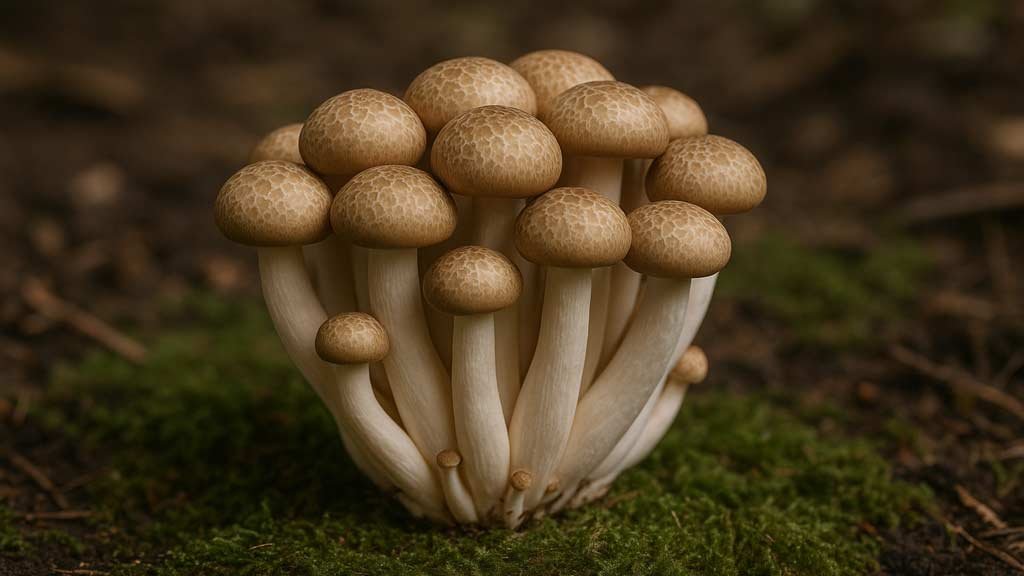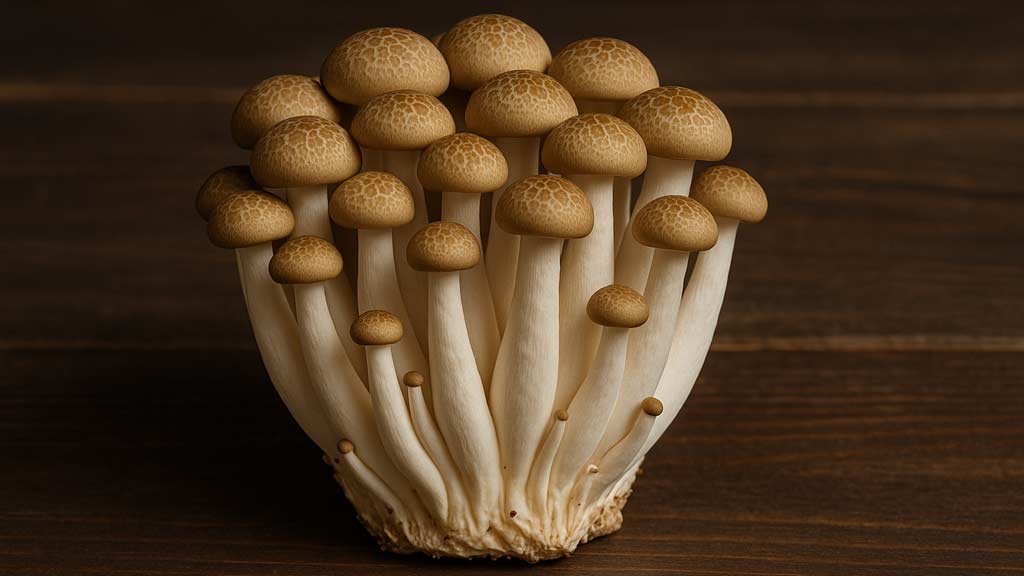A Taste of Japan in Every Bite
Shimeji mushroom (Hypsizygus tessellatus) is a small, elegant fungi native to East Asia. Often seen in Japanese and Korean cuisine, their delicate, clustered stems and tiny, bulbous caps carry a subtle, nutty flavor with a faintly sweet finish. They’re not just beautiful on the plate—they’re a powerhouse of nutrients and bioactive compounds.
When you sauté Shimeji mushrooms, there’s a satisfying snap as the stems yield, releasing an earthy aroma that fills the kitchen. You might notice a faint umami richness, almost like a whisper of the forest. It’s the kind of mushroom that makes you pause, stir slowly, and appreciate the flavors developing.
Table of Contents
Nutritional and Medicinal Profile
Shimeji mushrooms are low in calories but high in vitamins, minerals, and compounds with medicinal potential. Key nutrients include:
- B vitamins: Support energy metabolism and nervous system function
- Vitamin D: When exposed to sunlight, helps maintain bone health
- Potassium and phosphorus: Aid cardiovascular and kidney function
- Antioxidants: Including ergothioneine and phenolic compounds that protect cells from oxidative damage
These nutrients work in concert, contributing to overall health, energy maintenance, and longevity. But beyond basic nutrition, Shimeji mushrooms have unique medicinal properties.
Bioactive Compounds
- Beta-glucans: Promote immune system activity and gut health
- Lectins and polysaccharides: Potential modulators of inflammation
- Phenolic acids: Offer antioxidant protection and reduce cellular stress
It’s remarkable how such tiny mushrooms pack a punch, quietly supporting your health while delighting your taste buds.
Antioxidant Benefits
Shimeji mushrooms stand out for their antioxidant properties. Oxidative stress—caused by free radicals—can damage cells, contribute to aging, and increase the risk of chronic diseases. Antioxidants in Shimeji mushrooms help neutralize free radicals and protect cellular integrity.
- Ergothioneine: A rare amino acid with potent antioxidant activity
- Polyphenols: Reduce inflammation and support vascular health
- Beta-glucans: Indirectly support antioxidant defense by boosting immune function
Imagine these compounds patrolling your body, intercepting oxidative threats before they take root. It’s not dramatic or flashy, but consistent consumption seems to make a difference over time.
Supporting Immunity
Beta-glucans in Shimeji mushrooms are key for immune modulation. They enhance the activity of natural killer cells and macrophages—your body’s frontline defenders. People who regularly include these mushrooms in their diet often notice fewer colds and quicker recovery from minor illnesses.
Other supportive compounds:
- Lectins: Help regulate immune responses
- Polysaccharides: Strengthen gut flora, indirectly supporting immunity
Cooking doesn’t completely destroy these benefits, though gentle methods like sautéing or steaming preserve the most nutrients.
Heart and Metabolic Health
Shimeji mushrooms may also play a role in cardiovascular and metabolic health. Beta-glucans help maintain healthy cholesterol levels, while potassium supports blood pressure regulation. Some studies indicate that regular mushroom consumption may improve lipid profiles and aid in glucose management.
- Cholesterol management: Beta-glucans bind to cholesterol in the gut, promoting excretion
- Blood pressure support: High potassium content balances sodium
- Blood sugar modulation: Polysaccharides may help regulate glucose absorption
It’s impressive how a small mushroom can contribute to multiple aspects of metabolic health without requiring a massive serving.
Culinary Uses and Sensory Experience
Shimeji mushrooms are versatile and rewarding in the kitchen. Their firm, slightly crunchy texture holds up well under heat, making them perfect for stir-fries, soups, and hot pots. The flavor deepens when cooked, revealing subtle nutty and savory notes.
Preparation tips:
- Separate clusters before cooking to ensure even heat distribution
- Sauté in a little olive oil or sesame oil with garlic for maximum flavor
- Add to broths or stews to enrich umami depth
- Light steaming retains nutrients and texture
One bite, and you’ll notice a tender snap, a gentle chew, and a delicate flavor that pairs beautifully with leafy greens, tofu, or grains.

Integrating Shimeji Mushrooms into Daily Diet
Daily inclusion doesn’t have to be complicated:
- Toss lightly sautéed mushrooms over rice bowls or grain salads
- Blend powdered Shimeji extract into soups or sauces for concentrated benefits
- Include in omelets or vegetable stir-fries
- Add to noodle dishes or ramen for an antioxidant boost
It’s a mushroom that works quietly in your diet, enhancing both flavor and nutrition without fuss.
Digestion and Gut Health
Shimeji mushrooms are rich in dietary fiber, which aids digestion and promotes gut flora diversity. Beta-glucans act as prebiotics, feeding beneficial bacteria in the colon. A healthy gut contributes to:
- Improved digestion and nutrient absorption
- Reduced bloating and discomfort
- Strengthened immunity
- Balanced metabolic function
Think of it as a gentle, daily reset for your digestive system—pleasant, unobtrusive, and cumulative.
Safety and Considerations
Shimeji mushrooms are generally safe for most people. Some tips to ensure maximum benefit:
- Cook thoroughly to enhance digestibility and flavor
- Start with moderate portions if trying for the first time
- Store fresh mushrooms in a cool, ventilated area to prevent spoilage
- Avoid wild-harvested mushrooms unless identified by an expert
These small precautions allow you to enjoy Shimeji mushrooms safely while maximizing their health potential.
Anecdotes and Lifestyle Integration
I recall trying Shimeji mushrooms in a miso soup on a rainy evening in Tokyo. The delicate, nutty flavor and tender crunch contrasted beautifully with the broth’s savory depth. Over the week, including small servings in various dishes, I felt lighter, more energized, and subtly more resilient against minor colds.
Many regular consumers report similar experiences: gentle, cumulative health benefits combined with culinary enjoyment. It’s a mushroom that encourages consistency, making it easy to integrate into everyday meals.
Combining with Other Functional Foods
For optimal benefit, pair Shimeji mushrooms with complementary foods:
- Garlic and onions for cardiovascular support
- Leafy greens for additional antioxidants
- Whole grains for fiber synergy
- Healthy fats like olive or sesame oil for nutrient absorption
These combinations amplify both flavor and medicinal effect, enhancing the mushroom’s role as a functional food.
Growing Your Own Shimeji Mushrooms
Shimeji mushrooms can be cultivated at home under controlled conditions. They thrive on sterilized sawdust or substrate mixtures, producing clustered stems ideal for culinary use. Growing your own allows you to enjoy fresh, potent mushrooms and provides the satisfaction of cultivating both food and wellness.
Summary of Benefits
Shimeji mushrooms deliver multiple layers of support:
- Antioxidant protection: Ergothioneine, polyphenols, and beta-glucans
- Immune support: Beta-glucans, lectins, polysaccharides
- Cardiovascular health: Cholesterol management and blood pressure regulation
- Gut health: Prebiotic fiber and digestive support
- Culinary delight: Nutty, savory flavor and firm texture
It’s a small mushroom with a large impact—a functional food that rewards daily use.
Best Selling Shimeji Mushroom Supplements
Final Thoughts
Shimeji mushrooms blend culinary pleasure with health benefits. They’re delicate yet nutrient-rich, subtle yet powerful. Including them in your diet supports antioxidant defense, immunity, heart health, and digestion. Over time, this little fungus quietly fosters vitality and balance, a reminder that wellness often comes from consistent, thoughtful habits rather than dramatic interventions.
Article Sources
At AncientHerbsWisdom, our content relies on reputable sources, including peer-reviewed studies, to substantiate the information presented in our articles. Our primary objective is to ensure our content is thoroughly fact-checked, maintaining a commitment to accuracy, reliability, and trustworthiness.
- Akramiene, D., Paskauskas, V., & Bernatoniene, J. (2007). Effects of beta-glucans on the immune system. Current Drug Targets, 8(1), 19–27. https://doi.org/10.2174/138945007779940331
- Assemie, M. A., & Asgarpanah, J. (2022). The effect of edible mushrooms on health and their bioactive compounds. Phytotherapy Research, 36(3), 835–853. https://doi.org/10.1002/ptr.7433
- Cerletti, C., & Galli, G. (2021). Edible mushrooms and beta-glucans: Impact on human health. Nutrients, 13(10), 3447. https://doi.org/10.3390/nu13103447
- De Felice, B., & Mazzanti, G. (2020). Effect of beta- and alpha-glucans on immune modulating activity. Food Research International, 137, 109342. https://doi.org/10.1016/j.foodres.2020.109342
- Łysakowska, P., & Kaczmarek, M. (2023). Medicinal mushrooms: Their bioactive components and health benefits. Antioxidants, 12(4), 1003. https://doi.org/10.3390/antiox12041003
- Plant-Based Iron, Iodine, and Mineral Support Using Herbs - January 23, 2026
- Vegan Alternatives to Beeswax and Honey in Herbal Preparations - January 22, 2026
- Alcohol Free Herbal Extracts, Glycerites, Vinegar Extracts, and Teas Explained - January 22, 2026











